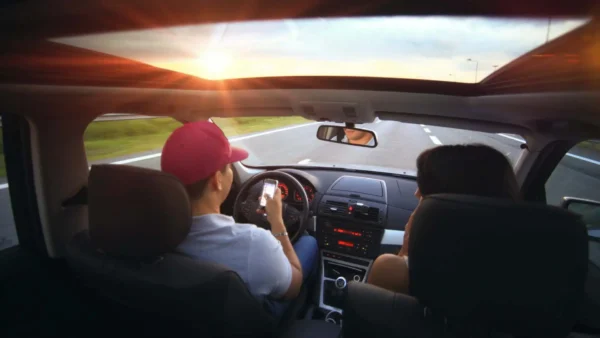The latest survey from Travelers Canada adds yet another layer to the complex issue of distracted driving. In addition to cellphones, GPS, food and drink, there are a number of emotional stressors that can take drivers’ attention from the road.
Distracted driving continues to be a major issue. In Ontario, it is leading to more and more unnecessary deaths on our roads. In March 2023, Travelers Canada conducted a survey of more than 1,000 Canadians aged 18-69 to gain insights into why drivers behave the way they do, and seek solutions to the problem.
This is the second year that Travelers has conducted their distracted driving survey in Canada. The results suggest that distracted driving on our roads continues to get worse, and that we all need to play a role in changing this.
Attitudes and experiences related to distracted driving
The survey revealed the following:
- 30% have gotten in an accident because they were distracted (up 50% from 2022)
- 25% of respondents have had a near miss because they were distracted (up 56%)
- 19% have gotten in an accident caused by another distracted driver (up 58%)
- 30% said driving is more dangerous since the pandemic (up 36%)
- Nearly 25% acknowledged that multitasking while driving was dangerous, but said they do it anyway
“There’s no question that more people are driving distracted,“ said Paul Stone, Vice President of Personal Insurance, Sales, Distribution & Marketing at Travelers Canada. “We’re also more aware of the problem, but there’s a difference between acknowledging a problem and changing our behaviour.”
All of us need to start speaking up when we see others driving distracted…
Paul Stone, Travelers Canada
Get an auto insurance quote in minutes.
What are Canadians doing behind the wheel?
The survey results highlighted the following driver behaviours behind the wheel:
- 63% use their phones or hands-free technology
- 48% make or receive calls while holding the phone
- 56% look at a map or GPS directions
- 21% read texts or emails
- 58% eat or drink
There have been numerous studies looking at driver distraction. The Travelers survey goes further than most by including emotional stressors. Respondents reported the following things cause them stress while driving:
- Looking for parking (49%)
- Following directions (43%)
- Other drivers’ behaviour (78%)
- The behaviour of passengers in their vehicle (34%)
- Traffic (62%)
About one-in-six respondents also reported that they often get intensely emotional or cry while driving.
“There’s been a spike in anxiety and depression since the pandemic,” said Stone. “And studies show that stress can also have a negative impact on driving. That’s why we thought it was important to add emotional stressors to the conversation about distracted driving.”
What is the solution?
- Make use of the “do not disturb” function on your phone while driving.
- If you need to make a call, only use hands-free calling and keep it short.
- Map out your route and parking location before you get on the road.
The survey also revealed some ways that drivers can be externally motivated to change their behaviour.
- 90% of respondents said they’d be less likely to multitask behind the wheel if one of their passengers asked them to stop.
- 93% of those with a distracted driving policy at work said they usually follow it (but only 17% of respondents have a distracted driving policy at work).
The 2022 edition of the survey uncovered that many Canadians feel pressure to stay connected at all times for work-related communications, and Stone says that employers can help change that.
“Employers can help set the tone,” said Stone. “Companies should all have a clear policy against distracted driving on the job, and make it clear to their employees that whatever it is, that email or that call, can wait until you get where you’re going.”
Want to save for driving safely?
People who want real-time feedback on their driving behaviour and a financial incentive to drive more safely may want to look into a telematics program. Programs vary by insurer, but most measure your speed, braking, the time of day you drive and other factors that influence safety, and give a discount of 10-25% for safe driving. Some now even monitor whether or not you move your phone while the car is in motion. (Note that most of the telematics apps now allow you to indicate when someone else is driving.)
Telematics aside, Stone said we can all be part of a much-needed cultural shift: “We all played a role in creating a stigma around impaired driving, and we can do the same thing with distracted driving. All of us need to start speaking up when we see others driving distracted, whether it’s an Uber driver, our work colleague or our spouse.”
Learn more about the 2023 Travelers Canada Distracted Driving Risk Survey.
Looking for car insurance?
Speak with a Mitch Insurance broker today to get a quote on Ontario auto insurance.
Call now
1(403)8000267







